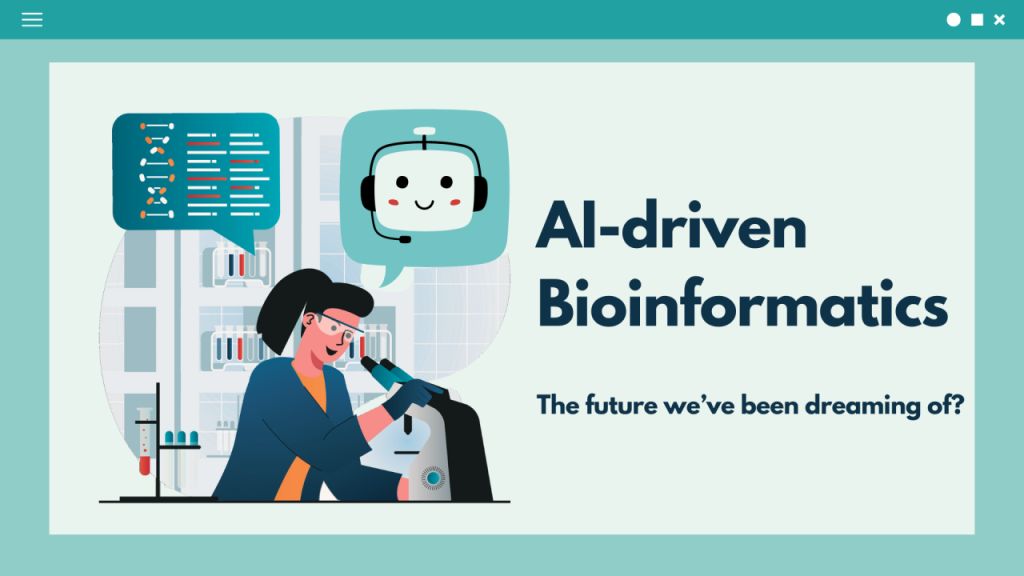When AI Meets Bioinformatics

With the exponential growth in biological data and the increasing complexity of analyses required to interpret it, AI is emerging as a critical tool in bioinformatics, enhancing traditional methods and opening new frontiers in life sciences. These tools are helping researchers uncover complex biological phenomena with remarkable speed and precision.
By leveraging machine learning algorithms and deep neural networks, AI is already enabling the discovery of novel biomarkers, predicting disease outcomes, and personalizing treatment strategies with precision. From genomics and transcriptomics to proteomics and metabolomics, these tools can identify patterns, make predictions, and even uncover hidden relationships within data that are beyond human capacity to detect. As AI continues to evolve, its integration into bioinformatics processes is certain to revolutionize how we understand and manipulate biological systems.
In this short blog we explore how AI is reshaping the landscape of bioinformatics.
Enhancing Data Analysis and Interpretation
One of the most significant advancements in bioinformatics is the automation of data analysis and interpretation. Traditional bioinformatics tools often require manual intervention and substantial expertise to process and analyze large-scale datasets. In contrast, advanced computational tools can automate these processes, reducing time and minimizing potential errors. Integrating such tools into bioinformatics workflows allows for real-time insights and visualizations, greatly aiding data interpretation. For instance, recent developments in computational platforms have enabled the real-time analysis of single-cell RNA sequencing data, allowing biologists to derive insights faster and focus on higher-level research questions.
In a recent publication, Wang et al. (2024) introduced Bioinformatics Copilot 2.0, a tool designed to assist biologists in transcriptomic data analysis. The platform provides real-time access to information, user-controlled analysis, and automated documentation, acting as a comprehensive assistant for data-driven research.
Accelerating Knowledge Discovery
Beyond mere data analysis, AI is being used to enhance knowledge discovery in bioinformatics. Large language models (LLMs), such as ChatGPT and other foundational models, are being trained to understand and interpret biological literature, generate hypotheses, and provide comprehensive analyses. This has led to the development of benchmarking frameworks, like Bioinfo-Bench by Chen et.al., to assess how well these models perform in knowledge acquisition and application in the bioinformatics domain. Such evaluations are crucial to refine these models, ensuring they can meet the practical needs of researchers and clinicians.
Automating Complex Bioinformatics Workflows
AI is also driving innovation in automating entire bioinformatics workflows using agents. These agents can now autonomously manage tasks ranging from data extraction to workflow design and code generation. This level of automation is transformative, reducing the manual burden on scientists and enabling them to conduct more comprehensive and in-depth analyses. In a recent work by Xin et.al. (2024), they developed a BioInformatics Agent (BIA) to demonstrate how AI can facilitate sophisticated data processing and analysis, empowering researchers to explore complex biological questions more effectively.
The Future of AI in Bioinformatics
The integration of AI in bioinformatics is still evolving, but its potential to reshape biological research is undeniable. As AI models and algorithms become more advanced, they will further enhance researchers’ ability to fully leverage data, analyze complex datasets, generate new hypotheses, and deepen our understanding of biological systems. The future of bioinformatics lies in leveraging AI to not only accelerate current research but also to pioneer new methods of inquiry that were previously unattainable.
For biologists, researchers, and scientists, embracing AI means tapping into a powerful tool that can augment human expertise, reduce repetitive tasks, and lead to breakthroughs that could redefine our understanding of life itself. As these technologies continue to mature, they will undoubtedly play a pivotal role in the next wave of discoveries in the life sciences.
Authored by: ARMAN KAZMI
